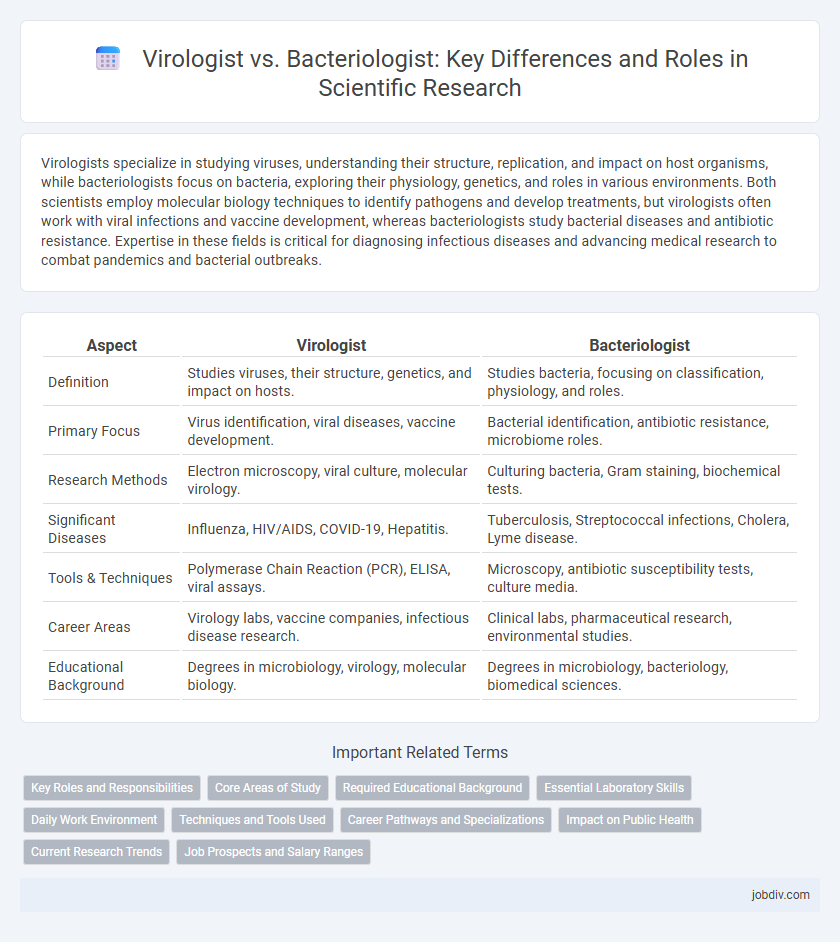Virologists specialize in studying viruses, understanding their structure, replication, and impact on host organisms, while bacteriologists focus on bacteria, exploring their physiology, genetics, and roles in various environments. Both scientists employ molecular biology techniques to identify pathogens and develop treatments, but virologists often work with viral infections and vaccine development, whereas bacteriologists study bacterial diseases and antibiotic resistance. Expertise in these fields is critical for diagnosing infectious diseases and advancing medical research to combat pandemics and bacterial outbreaks.
Table of Comparison
| Aspect | Virologist | Bacteriologist |
|---|---|---|
| Definition | Studies viruses, their structure, genetics, and impact on hosts. | Studies bacteria, focusing on classification, physiology, and roles. |
| Primary Focus | Virus identification, viral diseases, vaccine development. | Bacterial identification, antibiotic resistance, microbiome roles. |
| Research Methods | Electron microscopy, viral culture, molecular virology. | Culturing bacteria, Gram staining, biochemical tests. |
| Significant Diseases | Influenza, HIV/AIDS, COVID-19, Hepatitis. | Tuberculosis, Streptococcal infections, Cholera, Lyme disease. |
| Tools & Techniques | Polymerase Chain Reaction (PCR), ELISA, viral assays. | Microscopy, antibiotic susceptibility tests, culture media. |
| Career Areas | Virology labs, vaccine companies, infectious disease research. | Clinical labs, pharmaceutical research, environmental studies. |
| Educational Background | Degrees in microbiology, virology, molecular biology. | Degrees in microbiology, bacteriology, biomedical sciences. |
Key Roles and Responsibilities
Virologists specialize in studying viruses, focusing on viral structure, replication, and pathogenesis to develop vaccines and antiviral drugs. Bacteriologists concentrate on bacteria, analyzing bacterial physiology, genetics, and interactions to improve antibiotics and infection control. Both play critical roles in infectious disease research, diagnostics, and public health management.
Core Areas of Study
Virologists specialize in studying viruses, focusing on viral structure, replication, pathogenesis, and interaction with host cells, including mechanisms of viral infection and immune response. Bacteriologists concentrate on bacteria, examining bacterial morphology, physiology, genetics, and their roles in health, disease, and environmental ecosystems. Both disciplines investigate microbial control and antibiotic resistance, but virologists emphasize viral diseases, while bacteriologists focus on bacterial infections and applications.
Required Educational Background
Virologists typically require a Ph.D. in virology, microbiology, or a related biomedical field, emphasizing specialized training in viral pathogenesis and molecular biology. Bacteriologists often hold advanced degrees such as a master's or Ph.D. in microbiology or bacteriology, focusing on bacterial physiology, genetics, and infectious disease mechanisms. Both disciplines demand extensive laboratory experience and knowledge in microbial techniques, but the educational emphasis differs according to viral or bacterial research specialization.
Essential Laboratory Skills
Virologists and bacteriologists both require proficiency in aseptic techniques, microscopic examination, and culture methods, but virologists specialize in cell culture, viral isolation, and polymerase chain reaction (PCR) for viral genome detection. Bacteriologists emphasize Gram staining, antibiotic sensitivity testing, and biochemical assays to identify bacterial species and their resistance profiles. Mastery of molecular diagnostics and biosafety protocols is critical in virology due to the pathogenic nature of viruses compared to the more diverse culturing techniques used in bacteriology.
Daily Work Environment
Virologists primarily work in biosafety level laboratories focusing on virus isolation, genetic sequencing, and cell culture techniques to study viral pathogens. Bacteriologists conduct experiments involving bacterial cultures, antibiotic resistance testing, and microbial identification within microbiology labs, often using petri dishes and automated analyzers. Both professionals utilize microscopes and molecular biology tools but differ in pathogen type and laboratory safety protocols specific to viruses or bacteria.
Techniques and Tools Used
Virologists primarily utilize cell culture, polymerase chain reaction (PCR), and electron microscopy to study virus structure, replication, and genetic material, while bacteriologists rely on techniques like Gram staining, bacterial culture, and biochemical assays to identify and characterize bacterial species. Advanced genomic sequencing and fluorescence microscopy are increasingly common in both disciplines for detailed pathogen analysis. The choice of tools reflects the fundamental differences in virus and bacterial biology, with viruses requiring host cells for replication and bacteria being independently culturable organisms.
Career Pathways and Specializations
Virologists specialize in studying viruses, focusing on viral pathogenesis, immunology, and vaccine development, often pursuing careers in infectious disease research, epidemiology, or biotechnology industries. Bacteriologists concentrate on bacteria, exploring bacterial physiology, genetics, and antibiotic resistance, with career pathways in clinical microbiology, pharmaceutical research, or environmental microbiology. Both professions require advanced degrees in microbiology or related fields, with opportunities for specialization through postdoctoral research or professional certifications.
Impact on Public Health
Virologists play a critical role in public health by studying viruses that cause pandemics such as influenza, HIV, and COVID-19, enabling the development of vaccines and antiviral therapies that reduce transmission and mortality rates. Bacteriologists contribute significantly by identifying bacterial pathogens responsible for diseases like tuberculosis, cholera, and antibiotic-resistant infections, facilitating targeted treatments and infection control measures. Together, virologists and bacteriologists form the foundation for disease prevention, outbreak management, and the advancement of biomedical research crucial for global health security.
Current Research Trends
Current research in virology prioritizes the development of antiviral therapies and vaccine platforms targeting emerging RNA viruses such as SARS-CoV-2 and influenza strains. Bacteriologists focus on antibiotic resistance mechanisms in multidrug-resistant bacterial pathogens like carbapenem-resistant Enterobacteriaceae and explore novel bacteriophage therapy as an alternative treatment. Both fields employ advanced genomic sequencing and bioinformatics to track pathogen evolution and inform public health strategies.
Job Prospects and Salary Ranges
Virologists specializing in viral pathogens often find job prospects in pharmaceutical research, epidemiology, and public health sectors with average salaries ranging from $70,000 to $120,000 annually. Bacteriologists frequently work in clinical laboratories, food safety, and biotechnology industries, earning between $60,000 and $110,000 depending on experience and location. Both fields demand advanced degrees and offer competitive growth opportunities driven by emerging infectious diseases and antibiotic resistance research.
Virologist vs Bacteriologist Infographic

 jobdiv.com
jobdiv.com